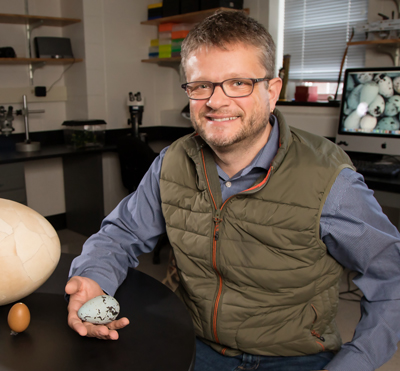
Mark E. Hauber, a professor of animal biology in the School of Integrative Biology and a member of the Cellular and Molecular Foundations of Intelligent Behavior Group at Beckman, will be the first fall speaker in the Beckman Institute’s Director’s Seminar series. Hauber will discuss “Tracking the Neuroecology of Avian Recognition Systems for Self and Others” at noon, Thursday, Sept. 13, in Room 1005 Beckman. Lunch is provided.
“Tracking the Neuroecology of Avian Recognition Systems for Self and Others”
Obligate brood parasitism in birds provides an exciting model system to study the evolution of social behaviors because, unlike 99 percent of bird species, they lay their eggs into nests of other species and are reared by foster parents. Similarly, how parasitic birds recognize themselves and how their hosts discriminate against parasites in the nests represent tractable proximate systems for the general biological study of decision-making processes. Here I review our recent studies, using neurophysiological, genomic and fMRI-based approaches, into the neurobiological basis of avian recognition systems and their impact on co-evolutionary arms races in behavioral interactions between hosts and parasites.
Speaker Biography
Mark E. Hauber is the Harley Jones Van Cleave Professor in the Department of Animal Biology at the School of Integrative Biology of the University of Illinois. He earned a B.S. at Yale University, a Ph.D. at Cornell University, and conducted postdoctoral work at the University of California, Berkeley. He has had faculty positions at the University of Auckland in New Zealand and the City University of New York. Shifting gears between behavioral, developmental, physiological, and molecular tools, he is studying the social and genetic consequences of species recognition in avian brood parasites. For more information visit www.cowbirdlab.org or follow @cowbirdlab on Twitter.